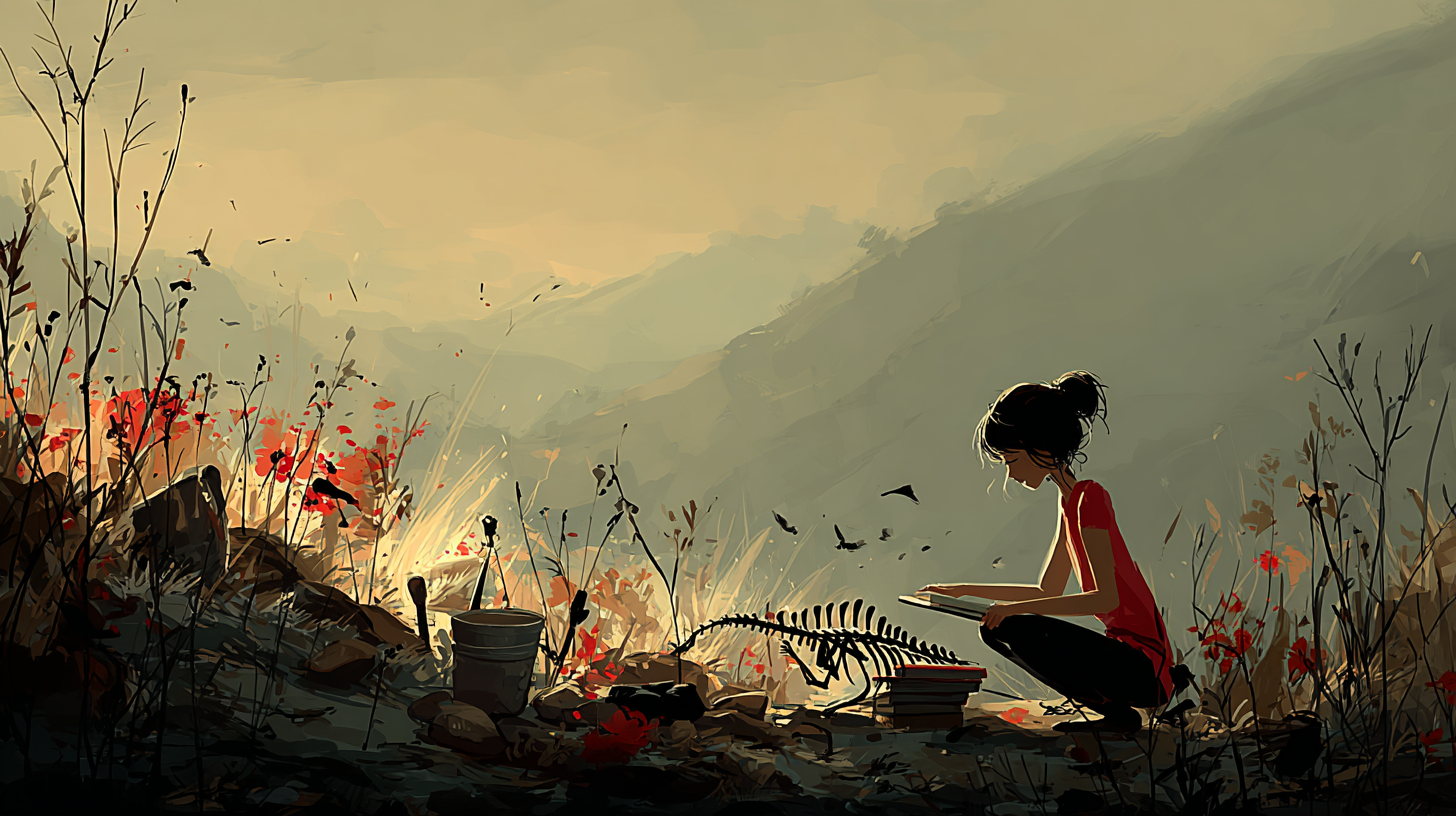A fossil is a bone or mark of an old animal that turned into stone.
fossilは、昔の生き物の骨や足あとが石になったものです。
以下は英単語 “fossil” に関するストーリー型学習コンテンツです。まずは大枠の意味を理解して最後の文章で確認しましょう。
主な意味(main meaning)
| 品詞 | 意味(簡潔な定義) | 発音記号(IPA) | 英語例文 |
|---|---|---|---|
| 名詞 (noun) | 昔の生き物の骨や跡が石になったもの | /ˈfɒs.əl/ | They found a dinosaur fossil in the desert. |
| 形容詞 (adjective) | 古くて時代遅れの | /ˈfɒs.əl/ | He has some fossil ideas about technology. |
語源(etymology)
語源: ラテン語 fossilis(掘り出されたもの)から。
イメージ: 地中から掘り出される「過去の記録」。
類義語(synonyms)
| 類義語 | 英語例文 |
|---|---|
| relic | This cave painting is a relic of ancient times. |
| remains | The archaeologists studied the remains of a prehistoric animal. |
| artifact | The museum displayed ancient artifacts from Egypt. |
| trace | They found traces of ancient plants in the rock. |
| impression | The fossil had a clear impression of a leaf. |
反義語(antonyms)
| 反義語 | 英語例文 |
|---|---|
| modern | This is a modern design using the latest technology. |
| new | She bought a new car last week. |
コロケーション(collocations)
| コロケーション | 英語例文 |
|---|---|
| dinosaur fossil | A huge dinosaur fossil was discovered in the mountain. |
| fossil fuel | Cars use fossil fuels like gasoline. |
| fossil record | The fossil record helps us learn about evolution. |
| fossil remains | Fossil remains were found near the river. |
| ancient fossil | They found an ancient fossil in the desert. |
2項表現(binomials)
| 2項表現 | 英語例文 |
|---|---|
| past and present | Fossils connect the past and present. |
| bones and fossils | The museum has many bones and fossils on display. |
英語ストーリー(english story)
Title: The Discovery in the Hills
Mina is a high school student who loves science. One sunny Saturday, she went hiking in the hills behind her town. As she walked along a rocky path, she saw something unusual sticking out of the ground. It looked like a bone. Curious, she started digging around it carefully.
After a few minutes, she realized it was a dinosaur fossil. She had read about these in books, but she never thought she would find one herself. She took a picture and sent it to her science teacher.
The next day, a group of researchers came to investigate. They told her that the fossil was millions of years old. It was an ancient fossil, and very important for the fossil record. Mina was excited. She had made a big discovery!
The scientists also explained that fossils help us understand the past and present. “Without fossils,” one said, “we wouldn’t know much about extinct animals.” Mina nodded. She remembered learning about fossil fuels, like oil and gas, which also come from old plant and animal remains.
One researcher showed her other fossil remains found in the area, including impressions of leaves and traces of fish. Mina couldn’t believe how nature had kept these things safe for millions of years.
Mina’s friends joked that she had “old ideas” because she liked fossils so much. “Don’t be a fossil,” they laughed, using the word to mean someone with outdated thinking. But Mina just smiled. She knew that fossils were not just old—they were full of knowledge.
和訳
題名:丘での発見
ミナは科学が大好きな高校生です。ある晴れた土曜日、彼女は町の裏にある丘にハイキングに行きました。岩だらけの道を歩いていると、地面から何かが突き出ているのを見つけました。骨のように見えました。不思議に思ったミナは、慎重にその周りを掘り始めました。
数分後、それが**恐竜の化石(dinosaur fossil)**だと気づきました。本で読んだことはありましたが、自分で見つけるとは思っていませんでした。彼女は写真を撮って、理科の先生に送りました。
翌日、研究者のチームが調査に来ました。彼らはその化石が数百万年前のもので、とても重要な**化石記録(fossil record)**だと教えてくれました。ミナは大興奮。大きな発見をしたのです!
科学者たちは、化石が**過去と現在(past and present)**をつなぐ手がかりになると説明しました。「化石がなければ、絶滅した動物のことはあまりわからないでしょう」と一人の研究者が言いました。ミナはうなずきました。**化石燃料(fossil fuels)**についても習ったことを思い出しました。石油やガスのようなエネルギー源も、昔の生き物からできているのです。
別の研究者は、近くで見つかった他の化石の残骸(fossil remains)や、葉の跡(impressions)、魚の**痕跡(traces)**を見せてくれました。ミナは、自然が何百万年もこれらを守っていたことに驚きました。
ミナの友達は、彼女が化石に夢中になっているのを見て、「古臭いね」と冗談を言いました。「まるで**化石(fossil)**みたいだね」と笑いました。ここでは「時代遅れの人」という意味です。でもミナは笑っていました。化石はただ古いだけじゃなく、知識でいっぱいなのです。
Q&A
- Qfossilの類義語「relic」との違いは何ですか?
- A
「relic」は宗教的・歴史的に価値のある「遺物」で、人や文化と関係のあるものを指すことが多いです。一方、「fossil」は自然にできた昔の生き物の骨や跡を指します。
- Qfossilの類義語「remains」とはどう違いますか?
- A
「remains」は「残骸」や「遺体」を指し、fossilと同じく死後に残ったものですが、化石である必要はありません。fossilは石になったものに限られます。
- Qfossilの類義語「artifact」はどういうときに使うのですか?
- A
「artifact」は「人工物」や「道具」を指し、人が作ったものです。fossilは自然の中で偶然できたものなので、人工的ではありません。
- Qfossilの反義語「modern」とはどんな意味ですか?
- A
「modern」は「現代的な、今の時代の」という意味で、「fossil」が昔のもの・古いものを表すのに対し、その正反対です。
- Q「fossil fuel」はどんな意味で使いますか?
- A
「fossil fuel」は「化石燃料(石油・石炭・天然ガスなど)」を指し、昔の生物の残骸からできたエネルギー源のことです。エネルギーや環境問題の文脈でよく使われます。
- Q「fossil record」とは何のことですか?
- A
「fossil record」は「化石記録」のことで、過去の生物やその進化の証拠として残された化石の全体を指します。生物の歴史を知るための重要な情報源です。
- Q「dinosaur fossil」と「ancient fossil」はどう違いますか?
- A
「dinosaur fossil」は特に「恐竜の化石」のことで、「ancient fossil」は「古代の化石」という広い意味を持ちます。dinosaur fossilはancient fossilの一種です。
- Q「fossil remains」とは何ですか?
- A
「fossil remains」は「化石の残骸」で、化石として残った骨や体の一部などを指します。研究対象になることが多いです。



コメント